|
In This Issue...
- President's Message
- Member Spotlight: Annette Askren
- Fellow Spotlight: Nicole Campbell
- Student Feature: LaToya Roberts
- ANCDS Board Certification Interview with Rene Utianski
- ASHA Announcements
- Upcoming Conferences
- Member Accomplishments
ANCDS Board/Officers
Carole Roth, Ph.D., BC-ANCDS
President
Lynn Maher, Ph.D., CCC-SLP
President-Elect
Deanna Britton, Ph.D., CCC-SLP, BC-ANCDS
Secretary
Neila Donovan, Ph.D., CCC‐SLP
Treasurer
Janet Patterson, Ph.D., CCC-SLP
Immediate Past President
Jessica Brown, Ph.D., CCC-SLP
Executive Board Member
Jessica Galgano, Ph.D., CCC‐SLP
Executive Board Member
Ellyn Riley, Ph.D., CCC-SLP
Executive Board Member
Meghan C. Savage, Ph.D., CCC-SLP
Executive Board Member
Mary H. Purdy, Ph.D., BC-ANCDS
ANCDS Archivist
Sheryle Hazard, CAE
Executive Director
ANCDS Board Certification
Why become Board Certified?
- Recognizes your advanced clinical knowledge and skills
- Enhances your confidence in your clinical knowledge and skills
- Enhances consumer and referral source confidence in the care you can provide
- Encourages professional growth through the continuing education required for maintenance of board certification
- Provides a respected credential to support professional advancement
Click here to learn more about the application and certification process.
On-Demand CE Offerings (Expiring 12/31/22)
2021 Annual Scientific Meeting Lecture Recordings
View all On-Demand CE here!
Podcasts
Episode 19: A Conversation with Margaret Lehman Blake and Shannon M. Sheppard: Right Hemisphere Damage working group, Evidence-Based Clinical Research Committee
Welcome New Members!
Full Members
Arielle Allentoff, M.S., CCC-SLP
Elexea Aurilio, M.A., CCC-SLP, CBIS
Julie Drew, M.A., CCC-SLP
Michelle Gravier
Danielle Kealy, M.S., CCC-SLP
Sarah Key-DeLyria
Jennifer Miller, MEd, CCC-SLP
Tiffanie Morgan, M.S., CCC-SLP, CBIS
Angela Roberts, M.A., SLP, Ph.D.
Student Members
Maleah Cherry
Jani Hammit, M.A., M.Sc.
Allison King
Eileen Leddy
Danielle Pacholski
Contact Us
ANCDS
2345 Rice Street
Suite 220
St. Paul, MN 55113
Online: www.ancds.org
Email: [email protected]
Phone: 651-925-5528
Fax: 651-317-8048
Have feedback or suggestions for the newsletter? Contact us here!
|
President's Message
Dear ANCDS Colleagues and Friends,
Just as we begin to see light at the end of the COVID-19 pandemic, the past couple of weeks has seen the world turned upside down leading to more unknowns about the future of our world. As I am writing this letter for the quarterly ANCDS newsletter, I find it difficult to focus on daily responsibilities that seem less significant in the presence of current world events and the daily survival of those living in Ukraine or fleeing for safety. The miles of ocean that separate the lives of Ukrainians from our lives no longer feels so far away.
I do not want to take for granted the importance of what each of us contributes to the quality of life of those we serve. In doing so I believe we must be sensitive to how world events impact our thoughts and emotions as well as the thoughts and emotions of those we come in contact with professionally and personally. Therefore, I encourage each of you to reach out to those who make your life meaningful to let them know how important they are as individuals and to you specifically.
I am deeply grateful for the professional commitment and dedication of the ANCDS leadership, including members of the executive board, committee chairs, and committee members. They truly are engaged all year long in bringing the benefits of ANCDS to each of you so that you can learn through evidence-based clinical research studies published by the EBCR committee, chaired by JoAnn Silkes, Ph.D., CCC-SLP; by attending live and recorded webinars and annual scientific meetings provided by the Education and Standards Committee, chaired by Louise Keegan, Ph.D., CCC-SLP, BC-ANCDS; or seeking a mentorship toward becoming board certified by the Certification Board, chaired by Kim Eichhorn, MS, CCC-SLP, ATP, BC-ANCDS. I hope that many of you are staying up to date through the ANCDS social media sites supported by the Communications Committee, which also brings you the quarterly newsletters and is chaired by Martha Sherrill, Ph.D., CCC-SLP. The ANCDS Residency Program initially slated for piloting with the VA is pending completion of final details. Also in collaboration with the VA is a partnering agreement for offering increased continuing education opportunities.
Although we are still in the first quarter of 2022, ANCDS committees are already busy working on their goals. In this newsletter, you will read about some of their accomplishments, including:
- A newly published article by the EBCR TBI writing group on the role of the speech-language pathologist in return to work for adults with traumatic brain injury.
- A recently published article by the EBCR Aphasia writing group addressing the cognitive and linguistic benefits of aerobic exercise.
- A newly published article by the EBCR Right Hemisphere Disorders writing group; a systematic review of prosodic deficits following right hemisphere stroke.
- The Certification Board recently congratulated Rene L. Utianski, Ph.D., CCC-SLP, BC-ANCDS; and Jennifer Miller, M.Ed., CCC-SLP, BC-ANCDS, on becoming newly Board-Certified members.
- A new podcast was announced on March 7th: A conversation with Margaret Lehman Blake and Shannon M. Sheppard: Right Hemisphere Damage writing group, Evidence-Based Clinical Research Committee.
The above list represents just a sample of the work the ANCDS committees have accomplished in the past few months.
ANCDS represents a small community of exceptional speech-language pathologists, including educators, researchers, and clinicians with a common interest in neurologic communication disorders and sciences. At this time of year, we reflect on the number of members who have chosen to renew their ANCDS memberships and ask why others have elected not to renew their memberships. I am reaching out to each former, current, and new member to thank you for your membership and contributions to ANCDS. Without you, the members of ANCDS, we would not be able to provide the support and opportunities for advancing knowledge and skills for “enhancing the communicative lives of people with neurologic disorders,” (ANCDS Mission).
Each month I have the privilege of reviewing the list of new members of ANCDS and sending them a letter to thank them for joining. Recently I started asking new members how they heard about ANCDS and who, if anyone, was responsible for their joining. We are a small organization; therefore, it is important we better understand what attracts new members.
After more than 30 years of membership, I still recall who encouraged me to join. Do you recall how you learned about ANCDS? If you are a faculty member or clinician providing clinical supervision, consider introducing your students and peers to ANCDS. Encourage your students to apply for a student fellowship in April-May. The Membership Committee, chaired by Miriam Carroll-Alfano, Ph.D., is responsible for all aspects of membership including the Student Fellowship Program.
Another committee you may wish to consider becoming involved with is the Professional Affairs Committee, chaired by Amber Moncrief, M.A., CCC-SLP. This committee is responsible for making recommendations to the Executive Board regarding the advancement of the professional practice of speech-language pathology for patients with neurologic communication disorders. This committee also initiates and maintains liaisons with other professional associations and relevant consumer organizations.
The newest committee is the Race, Equity, Diversity, and Inclusion (REDI) Committee, chaired by Alaina Davis, Ph.D., CCC-SLP, CBIST. This ad hoc committee serves to support diversity, equity, and inclusion in ANCDS and encourage translation of the principles of race, diversity, equity, and inclusion into research, clinical practice, and clinical training. In honor of Black History Month, ANCDS recognized several groups through social media, including the Journal of the National Black Association for Speech-Language and Hearing (JNBASLH), the ANCDS REDI Ad Hoc Committee, and the EBCR Writing group focused on evidence-based practice associated with the clinical management of diverse populations led by Gloriajean Wallace, Ph.D., BC-ANCDS.
I encourage each member of ANCDS to ask themselves how they would like to contribute to ANCDS. You may be a relatively new member or someone who has been a member but is just now wanting to learn more about committees that interest you. Perhaps you prefer to investigate a short-term project that you can assist with, such as during the annual meeting or with a podcast or webinar (Education and Standards Committee); or at the Student Fellowship breakfast (Membership Committee). You may be interested in working on the newsletter or with social media (Communications Committee), or perhaps you are interested in learning about conducting systematic reviews (Evidence-Based Clinical Research Committee). Maybe you are interested in getting involved at the ground level with the newly developed REDI committee. No matter what your interest is, we encourage you to get involved. Consider your interest and review the committee descriptions here. Select a committee you are interested in reaching out to explore membership or maybe a short-term project; then click on the volunteer button! You can also look in the member directory for the committee chair or committee liaison email address or feel free to email me, Carole Roth, Ph.D., CCC, BC-ANCDS, or Janet Patterson, Ph.D., Immediate Past President, or Lynn Maher, Ph.D., President-Elect.
Finally, I want to express my sincerest appreciation to you, the members of ANCDS, without whom there would not be this exceptional organization of bright, talented, dedicated professionals, whose primary goal is delivering evidence-based professional practices to individuals with neurologic communication disorders. We do not know what tomorrow will be like in the current state of world events. However, we survived COVID-19 and enjoyed meeting online for educational programs, including the virtual Annual Scientific Meetings in 2020 and 2021. This year, plans are in the works for returning to an in-person Annual Scientific meeting in New Orleans. I am hopeful that when we meet to learn about current research and clinical strategies, to meet old and new friends and colleagues, we will be able to celebrate a more peaceful world. Please take care of yourselves, take care of your loved ones, reach out to your friends, colleagues, and those you serve, and let us each listen to the feelings of one another with an open mind and heart. And please maintain positive thoughts, wishes, and hopes for the people of Ukraine.
Sincerely,
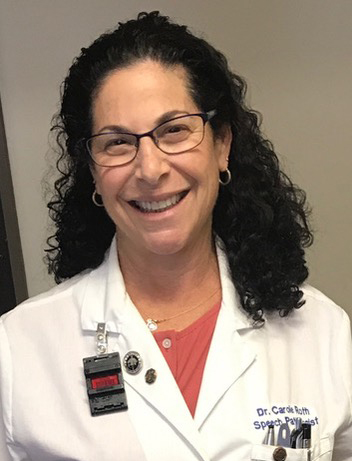
Carole R. Roth, Ph.D., BC-ANCDS
2022 ANCDS President
[email protected]
Member Spotlight: Annette Askren
Name: Annette N. Askren, CScD, CCC-SLP
Earned Degree(s)/University: Doctor of Clinical Science from the University of Pittsburgh; Master of Arts from San Diego State University
Workplace: VA Puget Sound Healthcare System, West Virginia University
Area(s) of research, teaching, and/or clinical interest: ALS, Clinical education, Bioethics
|
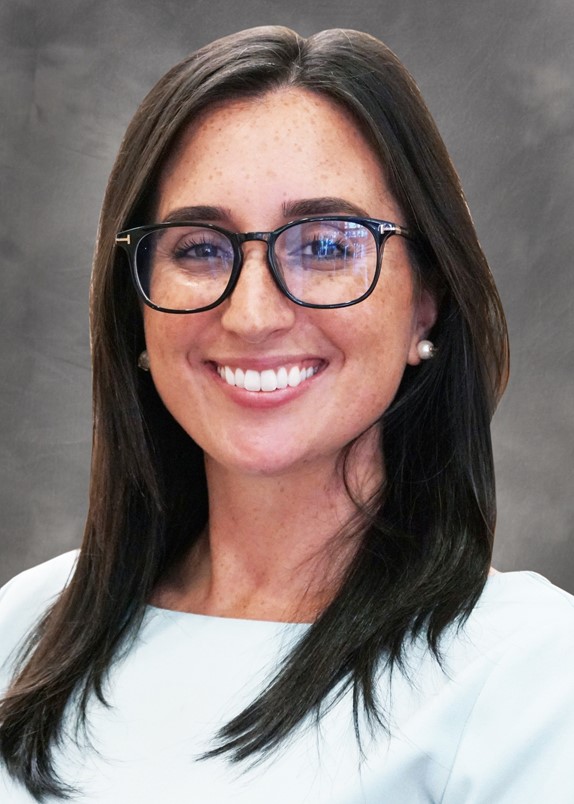
Annette N. Askren, CScD, CCC-SLP
|
1. Why did you join the communication committee?
When I am seeking membership and educational opportunities from an organization, I frequently ask myself, “Will this provide practice-changing information?” ANCDS always delivers. I wanted to be a part of this invaluable organization. ANCDS promotes the very best, in both the discovery and application of best practices, much of which has changed my practice for the better.
Fellow Spotlight: Nicole Campbell
Name: Nicole Campbell
Earned Degree(s): B.A. in Biology from UC Berkeley; M.S. in Medical Speech-Language Pathology from the University of Washington
Program of study/Year in program: Class of 2021/current Clinical Fellow at VA Puget Sound
Mentor/Advisor: Most influential professor: Dr. Kristie Spencer
Most influential clinical supervisor: Leslie Kot
ANCDS Fellowship Mentor: Dr. Mary Purdy
Area(s) of research, teaching, and/or clinical interests: Clinical interests: Compensatory supports for cognition, multimodal communication, communication partner training, dx and tx of dysarthria(s)
|
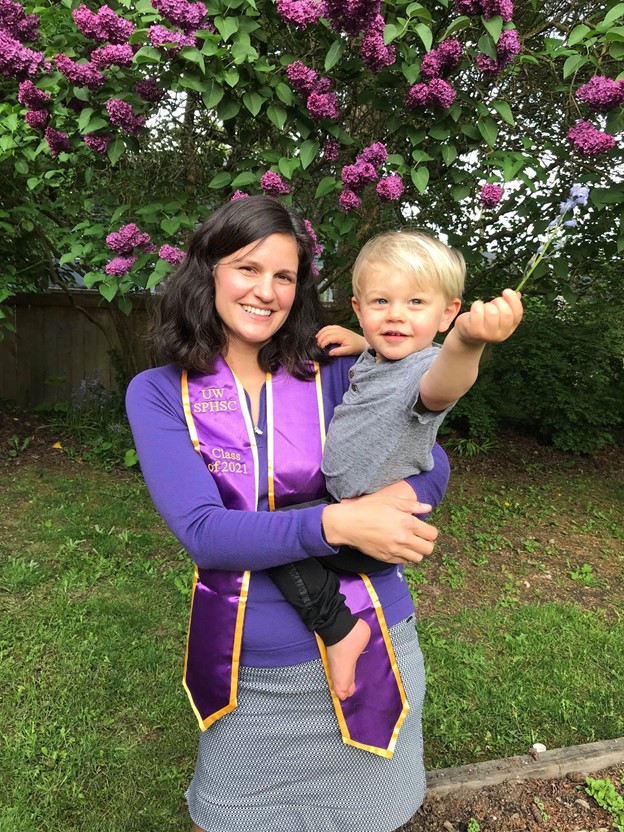
Nicole Campbell
|
1. Why were you interested in the ANCDS conference fellow program?
Our field is so broad; I wanted a space to engage with other SLPs who are passionate about the same areas of the field — neurogenic communication disorders.
Student Feature: LaToya Roberts
|
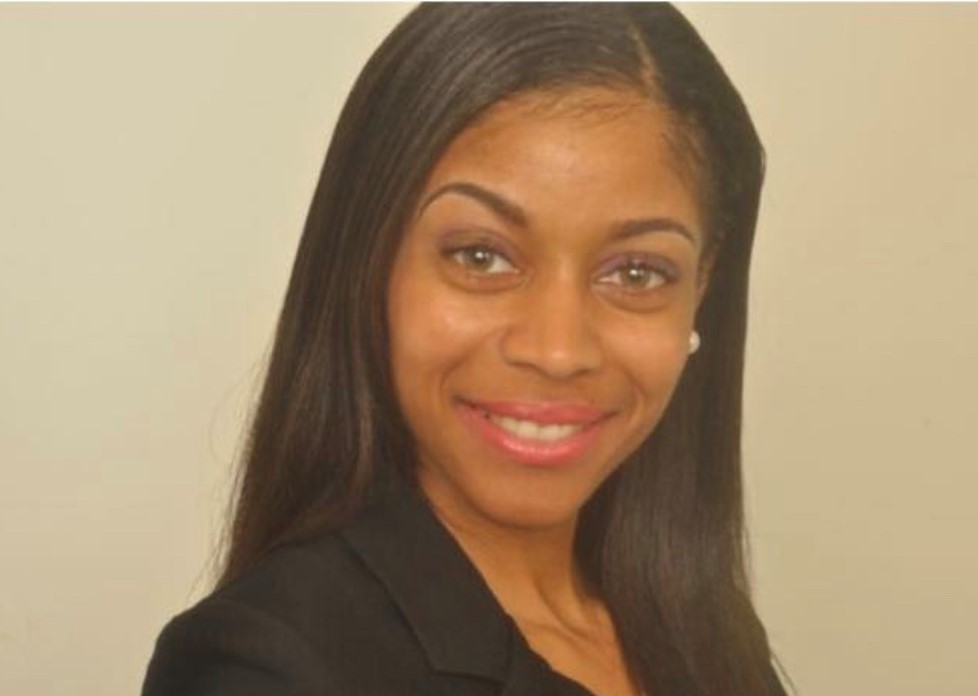
LaToya Roberts
|
1. Why did you become an ANCDS member?
Matriculating through my doctoral degree required additional experts assessing and managing individuals with cognitive-communicative disorders. I became a member of ANCDS to establish mentoring relationships and learn from expert clinicians and researchers. Throughout my membership, I have been inspired by the members' work, openness to new ideas, continuing education, and goal of keeping the voices of those with neurologic communication disorders in the light.
(Continue Reading)
ANCDS Board Certification Interview with Rene Utianski
|
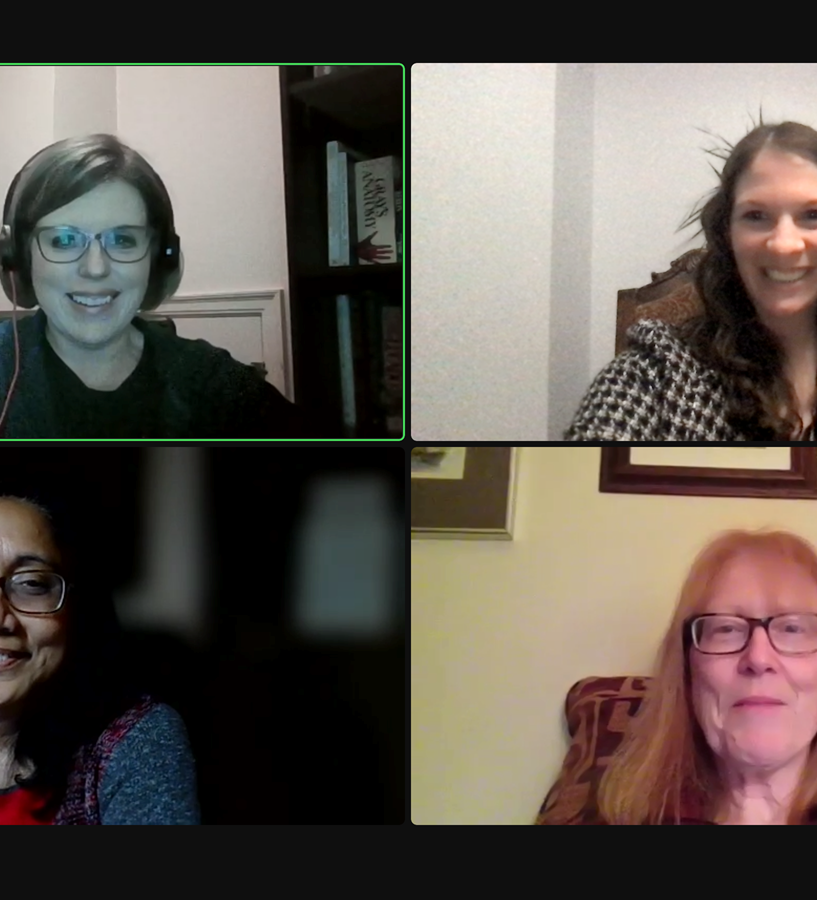
Top Right: Rene L. Utianski, Ph.D., CCC-SLP, BC-ANCDS
Top Left: Kim Eichorn, M.S., CCC-SLP, ATP, BC-ANCDS
Botton Left: Ramani Voleti, M.S., CCC-SLP, BC-ANCDS, Board Certification Committee Chair
Bottom Right: Mary Purdy, Ph.D., BC-ANCDS
|
1. What motivated you to pursue ANCDS board certification?
I’ve always been committed to practicing at the top of my scope, and board certification felt like a great way to demonstrate and maintain that.
2. What advantages do you see for yourself as an ANCDS board-certified speech-language Pathologist?
I have enjoyed connecting with other people who love to think and talk about the nitty-gritty of differential diagnosis in these patient populations. I feel fully vested in this wonderful community! Also, I still consider myself in the early part of my career — if I have 30+ years to go, that must be true! And I will publicly admit I still experience imposter syndrome. Successfully completing this has helped me overcome those bouts more quickly!
(Continue Reading)
2021 Annual Meeting Silver Sponsor
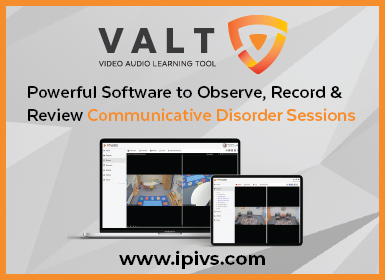
ANCDS does not endorse specific companies or products.
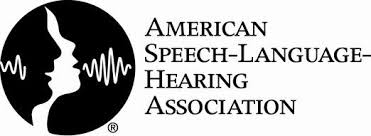
ASHA Announcements
Practice
- Are you looking for a unique learning opportunity? Be a part of the first ASHA Health Care Summit: Grand Rounds in COVID-19 Rehab. The online conference puts a spotlight on the unique impact of COVID pathophysiology on respiration, swallowing, and cognitive communication with an interdisciplinary focus. Then, spend a day in person with your colleagues building out a robust COVID toolkit for navigating whatever lies ahead for patients with COVID-19.
- Updates to the Practice Portals for Telepractice and Accent Modification are live. Portals are reviewed every three years to incorporate new research, clinical perspectives, and updated Evidence Maps.
Research & Mentoring:
- ASHFoundation 2022 Research Grants
ASHFoundation research grants, from $10,000 - $35,000, are available for innovative studies in all areas of communication sciences and disorders. The submission deadline is April 20.
Upcoming Conferences
Conference Name: 4th International Conference on Functional Neurological Disorders
Location: Hybrid (In-person Boston, MA)
Dates: June 19-21, 2022
Registration: https://www.fndsociety.org/biennial-meeting/2022/registration
Member Accomplishments
Whitney Postman, Ph.D., CCC-SLP, Principal Investigator for the Real-Time Ultrasound Intra-Oral Visual Feedback for Adult Acquired or Degenerative Motor- Speech Disorders received the Saint Louis University Research Growth Fund Award. Funding was extended through June 2022 after pandemic-related delays.
Adele Raade, Ph.D., was accepted into the 2022 General Cohort for the Leadership Development Program. Her project involves legislative advocacy.
Member Publications:
Askren, A. N., Cherney, L. R., & Morgan, S. (March 2022). Empowering patients to participate in treatment decisions. ASHA Leader. https://leader.pubs.asha.org/do/10.1044/leader.FTR2.27032022.46/full/
Boyle, M., Akers, C.M., Cavanaugh, R.C., Hula, W.D., Swiderski, A., & Elman, R.J. (2022). Changes in discourse informativeness and efficiency following communication-based group treatment for chronic aphasia. Aphasiology, https://doi.org/10.1080/02687038.2022.2032586
Boyle, M., Gordon, J.K., Harnish, S.M., Kiran, S., Martin, N., Rose, M.L., & Salis, C. (2022). Evaluating Cognitive-Linguistic Approaches to Interventions for Aphasia within the Rehabilitation Treatment Specification System (RTSS), Archives of Physical Medicine and Rehabilitation, doi: https://doi.org/10.1016/j.apmr.2021.07.816
Fridriksson, J., Basilakos, A., Boyle, M., Cherney, L.R., DeDe, G., Gordon, J.K., Harnish, S.M., Hoover, E.L., Hula, W.D., Hunting Pompon, R., Johnson, L.P., Kiran, S., Murray, L.L., Rose, M.L., Obermeyer, J., Salis, C., Walker, G.M., & Martin, N. (2022). Demystifying the complexity of aphasia treatment: Application of the Rehabilitation Treatment Specification System. Archives of Physical Medicine and Rehabilitation. https://doi.org/10.1016/j.apmr.2021.08.025
Chandregowda, A., & Clark, H. M. (2021). Characterizing anarthria to facilitate neurological diagnosis: A case illustration. Perspectives of the ASHA Special Interest Groups: SIG 2 Neurogenic Communication Disorders, 6(6), 1438-1444. https://doi.org/10.1044/2021_PERSP-21-00025
Chandregowda, A., Clark, H. M., Duffy, J. R., Machulda, M. M., Lowe, V. J., Whitwell, J. L., & Josephs, K. A. (2021). Dynamic aphasia as a variant of frontotemporal dementia. Cognitive and Behavioral Neurology, 34(4), 303-318. doi: http://dx.doi.org/10.1097/wnn.0000000000000289
Chapman, L.R., & Hallowell, B. (2021). The unfolding of cognitive effort during sentence processing: Pupillometric evidence from people with and without aphasia. Journal of Speech, Language, and Hearing Research, 64(11), 1-18. https://doi.org/10.1044/2021_JSLHR-21-00129
Chapman, L.R., & Hallowell, B. (2021). Supplemental material: The unfolding of cognitive effort during sentence processing: Pupillometric evidence from people with and without aphasia.
Cherney L.R., Carpenter J. (2022). Behavioral interventions for poststroke aphasia. Handbook of Clinical Neurology. 10.1016/B978-0-12-823384-9.00010-4
Cherney, L. R., DeDe, G., Hoover, E. L., Murray, L. L., Obermeyer, J., Pompon, R.H. (2022). Applying the Rehabilitation Treatment Specification System (RTSS) to Functional Communication Treatment Approaches for Aphasia. Archives of Physical Medicine and Rehabilitation. 10.1016/j.apmr.2021.10.016
Ashaie, S.A., Engel, S., & Cherney, L.R. (2022).Test-retest reliability of heart-rate variability metrics in individuals with aphasia. Neuropsychological Rehabilitation. 10.1080/09602011.2022.2037438
Alcala, C., Corwin, M., Kroll, T., & Whitaker, M. (2021). Engagement in small group interactions involving persons with primary progressive aphasia. Journal of Interactional Research in Communication Disorders, 11(2),127-150. https://doi.org/10.1558/jircd.21384
Armour, M., del Toro, C.M., Kiran, S., Raymer, A.M., & Wallace, S. (2021). Supportive communication for individuals with aphasia. Archives of Physical Medicine and Rehabilitation, 102(7), 1437-1439.
Hallowell, B., Hyter, Y.D., Watson, J.B., Combiths, P., Lansing, C.R., Ramkissoon, I., & Flynn, T. (2021). Final report by the Ad Hoc Committee to Develop Guidance for Members and Students Engaging Globally in Clinical, Scholarly, and Other Professional Activities. American Speech-Language-Hearing Association. Available at: https://www.asha.org/siteassets/reports/ahc-develop-guidance-for-engaging-globally.pdf
Hallowell, B., Hyter, Y.D., Watson, J.B., Combiths, P., Lansing, C.R., Ramikissoon, I., & Flynn, T. (2021, November). Evolving guidance for ethical global engagement in clinical, scholarly, service, and educational activities. Invited master class for the Special Interest Group on Global Issues in Communication Sciences and Disorders (SIG 17). Annual Convention of the American Speech-Language-Hearing Association. Washington, DC.
Lowit, A., & Kent, R. D. (2022). Management of dysarthria. In I. Papathanasiou & P. Coppens (Eds.), Aphasia and Related Neurogenic Communication Disorders, 3rd Ed. (pp. 641-671). Burlington, MA: Jones & Bartlett Learning.
Kent, R.D., Kim, Y., & Chen, L.M. (2022). Oral and laryngeal diadochokinesis across the lifespan: A scoping review of methods, reference data, and clinical applications. J. Speech, Lang., & Hear. Res., 65, 574–623.
Iuzzini-Seigel, J., Delaney, A., & Kent, R.D. (2022). Retrospective case-control study of communication and motor abilities in 143 children with suspected childhood apraxia of speech: Effect of concomitant diagnosis. Perspectives of the ASHA Special Interest Groups, 7(1), 45-55.
Kent, R.D. (2022). The maturational gradient of infant vocalizations: Developmental stages and functional modules. Infant Behav. Developm., 66. 101682.
Kluin, K.J., Mossner, J.M., Costello, JT.., Chou, K.L., & Patil, P.G. Motor speech effects in subthalamic deep brain stimulation for Parkinson's disease. J Neurosurg 2022; Jan 28;1-7.
Kang, Y., Kupfer, R.A., Ford-Baldner, E., Kluin, K.J., Hervey-Jumper, S.L., & Morrison, R.J.: Management of intractable chronic cough during awake craniotomy: illustrative case. J Neurosurg Case Lessons 2021; 2(25): CASE21480.
Snedakar, K. P., Lundine, J. P., Ciccia, A. H., Haider, M. N., & O’Brien, K. H. (2022). Gaps in concussion management across school-aged children. Brain Injury. Online ahead of print. https://doi.org/10.1080/02699052.2022.2034954
Obermeyer, J., Reinert, L., Kamen, R.M., Pritchard-Laval, D., Park, H. & Martin, N. (2022). Effects of Memory Load and Typicality of Semantic Category on Semantic Processing in Aphasia. American Journal of Speech-Language Pathology. 31(1):12-29. doi: 10.1044/2021_AJSLP-20-00283.
Martin, N., Obermeyer, J., Schlesinger, J., & Wiley, R. (2022). Treatment of the Linguistic and Temporal Components of Lexical Activation to Improve Word Retrieval in Aphasia. Frontiers in Rehabilitation Science, 3:824684. doi: 10.3389/fresc.2022.824684
O’Brien, K. H., Wallace, T., Kemp, A. M., & Pei, Y. (2022). Cognitive communication complaints and referrals for speech language pathology services following concussion. American Journal of Speech-Language Pathology, 31(2), 790–807. https://doi.org/10.1044/2021_ajslp-21-00254
Kemp, A., & O’Brien, K. H. (2022). Critical Elements of Return to Learn for Students With Concussion: A Scoping Review. Journal of Head Trauma Rehabilitation, 37(2), E113–E128. https://doi.org/10.1097/htr.0000000000000695
O’Connor-Wells, B., & Porcaro, C.K (Eds). (2022) A caregiver’s guide to communication and related disorders after brain injury or disease. Johns Hopkins University Press, Baltimore, MD.
Postman, W.A., Fischer, M., Dalton, K., Leisure, K., Thompson, S., Sankey, L., & Watkins, H. (2022) Coupling hearing health with community-based group therapy for cognitive health in low-income African American elders. Perspectives of the ASHA Special Interest Groups, SIG-8 on Public Health Audiology. https://doi.org/10.1044/2021_PERSP-21-00110
Sayers, M., Laval, D., Reilly, J. & Martin, N. (in press – February 2022). Integrity of input verbal short-term memory ability predicts naming accuracy and error types. Aphasiology.
Roitsch, J., Prebor, J., & Raymer, A.M. (2021). Cognitive assessments for patients with neurologic conditions: A preliminary survey of speech-language pathology practice patterns. American Journal of Speech-Language Pathology, 30, 2263-2274. https://doi.org/10.1044/2021_AJSLP-20-00187.
Sandberg, M., Madden, M., & Murray (2021) Cognitive and Linguistic Benefits of Aerobic Exercise: A State-of-the-Art Systematic Review of the Stroke Literature. Frontiers in Rehabilitation Sciences https://doi.org/10.3389/fresc.2021.785312
Sandberg, M. (2022) Tutorial for Abstract Semantic Associative Network Training (AbSANT): Theoretical Rationale, Step-by-Step Protocol, and Material Resources. Perspectives vol. 7 issue 1 p. 35-44 https://doi.org/10.1044/2021_PERSP-21-00176
Sandberg, Blanchette, & Lukyanenko (2022) Comprehension of Vernacular Features in Aphasia. JSLHR vol. 65 issue 2 p. 692-709 https://doi.org/10.1044/2021_JSLHR-21-00408
|